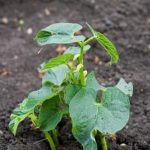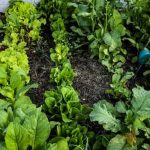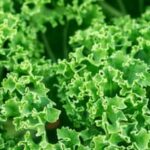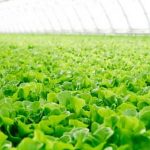Welcome to our blog post discussing what is a good insecticide for vegetable gardens. In a thriving garden, protecting your vegetable plants from harmful insects is essential to ensure a bountiful harvest. Whether you are a seasoned gardener or just starting out, understanding the importance of choosing the right insecticide can make a significant difference in the success of your garden.
In vegetable gardens, common pests such as aphids, caterpillars, and spider mites can wreak havoc on your plants if left unchecked. Identifying these pests and being proactive in controlling them is crucial to maintaining plant health and maximizing yields. Fortunately, there are various insecticides available that can help manage these unwanted visitors effectively.
When deciding on the best insecticide for your vegetable garden, you may come across the choice between organic and chemical options. Both types have their benefits and drawbacks, so it’s important to weigh your priorities in terms of effectiveness, environmental impact, and safety. By understanding the differences between organic and chemical insecticides, you can make an informed decision that aligns with your gardening practices and values.
Common Garden Pests
When it comes to maintaining a healthy vegetable garden, dealing with common garden pests is often a challenge that many gardeners face. These pests can wreak havoc on your plants, causing damage and reducing the yield of your crops. Some of the most typical pests that vegetable gardens encounter include aphids, caterpillars, and spider mites.
Aphids are small insects that feed on the sap of plants, causing leaves to curl and turn yellow. Caterpillars are voracious eaters, often leaving large holes in leaves and fruits as they consume plant tissues.
On the other hand, spider mites are tiny arachnids that suck the juices out of plants, resulting in a stippled or bronzed appearance on leaves. Dealing with these pests promptly is crucial to prevent them from multiplying and causing more significant harm to your vegetable garden.
| Pest | Description |
|---|---|
| Aphids | Small insects that feed on plant sap, causing leaf curling and yellowing |
| Caterpillars | Voracious eaters that leave large holes in leaves and fruits |
| Spider Mites | Tiny arachnids that suck plant juices, leading to a stippled appearance on leaves |
To effectively manage these common garden pests in your vegetable garden, it is essential to choose the right insecticide. Selecting an insecticide specifically designed for the type of pest you are dealing with is crucial for successful pest control.
Whether you opt for organic or chemical insecticides depends on various factors such as the severity of the infestation, environmental considerations, and personal preference. It’s important to consider what is a good insecticide for vegetable gardens and how it aligns with your gardening goals and values.
Organic vs Chemical Insecticides
When it comes to selecting the right insecticide for your vegetable garden, one of the crucial decisions you will have to make is choosing between organic and chemical options. Organic insecticides are derived from natural sources such as plants, bacteria, or minerals and are often considered safer for the environment and beneficial insects. On the other hand, chemical insecticides are synthetic compounds designed to target specific pests effectively.
Organic insecticides like neem oil, pyrethrin, and diatomaceous earth are popular choices among environmentally-conscious gardeners. These substances work by suffocating or disrupting the nervous system of pests without causing harm to beneficial insects such as bees and ladybugs. Additionally, they have minimal residual effects on plants and soil compared to their chemical counterparts. However, organic insecticides may require more frequent application and could be less potent in controlling severe pest infestations.
Chemical insecticides, such as bifenthrin, permethrin, and malathion, are known for their immediate knockdown effect on a wide range of pests. They are formulated to provide long-lasting protection against harmful insects with fewer applications needed in some cases.
While chemical insecticides can be effective in combating pest outbreaks effectively, they may also have negative impacts on non-target organisms and the overall ecosystem if not used correctly. It is essential to follow label instructions carefully and consider the environmental implications when using chemical insecticides in your vegetable garden.
| Organic Insecticides | Chemical Insecticides |
|---|---|
| Derived from natural sources | Synthetic compounds |
| Environmentally-friendly | Effective against a wide range of pests |
| Minimal impact on beneficial insects | Potentially harmful to non-target organisms |
Choosing the Right Insecticide
When it comes to choosing the right insecticide for your vegetable garden, there are several factors to consider. Whether you opt for an organic or chemical option, finding the best fit for your specific needs is crucial in effectively protecting your plants from harmful pests. Here are some key considerations to keep in mind:
- Compatibility: Different insecticides may be more suitable for certain types of vegetables. It’s important to choose a product that will effectively target the pests troubling your specific crops without causing harm to the plants themselves.
- Application methods: Some insecticides are designed for foliar application, while others may work better when applied directly to the soil. Consider how you prefer to apply the product and choose one that aligns with your gardening practices.
- Residual effects: Depending on the insecticide chosen, it may have a short-term or long-term residual effect. Be mindful of this when making your selection, especially if you are dealing with persistent pest issues.
By carefully weighing these factors, you can make an informed decision on what is a good insecticide for vegetable gardens and ensure that your plants receive the protection they need without compromising their health in the process. Remember to always follow label instructions and take necessary precautions when applying any type of insecticide in your garden.
Recommended Insecticides for Vegetable Gardens
When it comes to choosing the right insecticide for your vegetable garden, it is essential to consider the specific pests that are causing damage to your plants. Whether you prefer organic or chemical options, there are several effective insecticides available on the market that can help protect your vegetables. Here are some recommendations for good insecticides that you can use in your vegetable garden:
- Neem oil: Neem oil is a popular organic insecticide that is derived from the seeds of the neem tree. It works by disrupting the feeding and reproductive activities of common garden pests like aphids, whiteflies, and beetles.
- Spinosad: Spinosad is another natural insecticide that is effective against caterpillars, thrips, and leafminers. It is derived from a soil bacterium and works by targeting the nervous system of insects.
- Pyrethrin: Pyrethrin is a chemical insecticide that is derived from chrysanthemum flowers. It is highly effective against a wide range of pests such as spider mites, aphids, and whiteflies. However, it is important to use pyrethrin with caution as it can also harm beneficial insects.
When deciding on which insecticide to use in your vegetable garden, it is important to consider factors such as the severity of pest infestations, potential harm to beneficial insects, and your personal preferences regarding organic or chemical options. Remember to always read and follow the label instructions for any insecticide you choose to ensure safe and effective application.
Overall, selecting a good insecticide for your vegetable garden involves careful consideration of various factors. By choosing the right product for your specific needs and following best practices for application, you can effectively protect your plants from harmful pests while promoting a healthy and thriving garden.
How to Use Insecticides Safely
Reading and Following Labels
When it comes to using insecticides in your vegetable garden, one of the most important things to keep in mind is reading and following the labels on the products. The label provides valuable information on how to use the insecticide correctly, including proper application rates, timing, and safety precautions.
By carefully reading and adhering to the instructions on the label, you can ensure that you are using the insecticide effectively while minimizing any potential risks to yourself, your plants, or the environment.
Protective Gear
Another essential aspect of using insecticides safely in your vegetable garden is wearing proper protective gear during application. This includes items such as gloves, long-sleeved shirts, long pants, closed-toe shoes, and goggles. These will help protect your skin, eyes, and respiratory system from coming into direct contact with the insecticide.
Additionally, consider using a mask or respirator if you are working with products that produce fumes or airborne particles. Prioritizing your safety by wearing protective gear can prevent accidental exposure and ensure a safe application process.
Environmental Considerations
When using insecticides in your vegetable garden, it is crucial to consider the potential impact on the environment. Avoid applying insecticides during windy conditions to prevent drift onto non-target areas or neighboring properties. Additionally, be mindful of runoff into water sources such as rivers or streams – choose products that are labeled as safe for aquatic environments when possible.
Limiting your use of chemical insecticides by opting for more targeted applications can also help minimize negative effects on beneficial insects and pollinators in your garden. By taking these environmental considerations into account, you can use insecticides safely while being mindful of their broader impact on ecosystems.
Integrated Pest Management (IPM)
Integrated Pest Management (IPM) is a holistic approach to pest control that aims to minimize the impact of insecticides on the environment while effectively managing pests in vegetable gardens. IPM focuses on prevention, monitoring, and control of pests through a combination of biological, cultural, physical, and chemical methods. By using a variety of pest control tactics, gardeners can reduce their reliance on insecticides and create a healthier garden ecosystem.
Benefits of IPM
One of the main benefits of adopting an IPM approach in your vegetable garden is reducing the need for chemical insecticides. By implementing strategies such as crop rotation, planting companion plants that deter pests, and using insect traps, you can limit the presence of harmful insects without resorting to toxic chemicals. Additionally, IPM helps to preserve beneficial insects that contribute to a balanced ecosystem in your garden.
Implementing IPM Strategies
To successfully implement IPM in your vegetable garden, start by identifying common pests in your area and monitoring their populations regularly. Use physical barriers like row covers or sticky traps to prevent pests from reaching your plants. Encourage natural predators like ladybugs and lacewings by providing them with habitats such as flowering plants or insect hotels.
When necessary, use targeted organic insecticides like neem oil or insecticidal soap to manage pest outbreaks while minimizing harm to beneficial insects and other wildlife. Remember that good cultural practices such as proper watering, mulching, and soil health can also enhance plant resistance to pests. By combining these techniques thoughtfully, you can create a resilient and sustainable vegetable garden with minimal reliance on chemical insecticides.
Conclusion
In conclusion, selecting the right insecticide for your vegetable garden is crucial to ensure the health and productivity of your plants. Whether you choose organic or chemical options, it’s essential to consider factors such as compatibility with different vegetables and safe application methods. Remember that the goal is not only to eliminate pests but also to protect beneficial insects and the environment as a whole.
When looking for a good insecticide for vegetable gardens, consider options like neem oil, spinosad, or pyrethrin which are effective against a variety of common garden pests. However, always prioritize safety by following label instructions carefully and taking necessary precautions when applying insecticides. Integrated Pest Management (IPM) strategies can also be beneficial in reducing pest populations without excessive reliance on chemicals.
Ultimately, the health of your vegetable plants should guide your choice of insecticide. By being mindful of the impact these products can have on both your garden and the broader ecosystem, you can make informed decisions that promote sustainability and long-term garden success. Remember, a healthy balance between pest control and environmental stewardship is key to maintaining a thriving vegetable garden.
Frequently Asked Questions
What Is the Best Pesticide to Use on Vegetables?
The best pesticide to use on vegetables is usually one that is labeled specifically for edible plants. Organic options like neem oil, insecticidal soap, or diatomaceous earth are safe choices that won’t leave harmful residues on your veggies.
Can I Use Insecticide in My Vegetable Garden?
Yes, you can use insecticide in your vegetable garden, but it’s important to choose a product that is safe for edible plants. Always read and follow the instructions on the label to ensure proper application and avoid any potential harm to yourself or the environment.
What Can I Spray on My Vegetables for Bugs?
There are several options for spraying vegetables to control bugs. In addition to organic pesticides like neem oil and insecticidal soap, you can also try homemade remedies like garlic or chili pepper sprays. Regularly inspecting your plants for pests and manually removing them can also be effective in controlling bug infestations.

If you’re looking to get into vegetable gardening, or are just looking for some tips on how to make your current garden better, then you’ve come to the right place! My name is Ethel and I have been gardening for years. In this blog, I’m going to share with you some of my best tips on how to create a successful vegetable garden.





